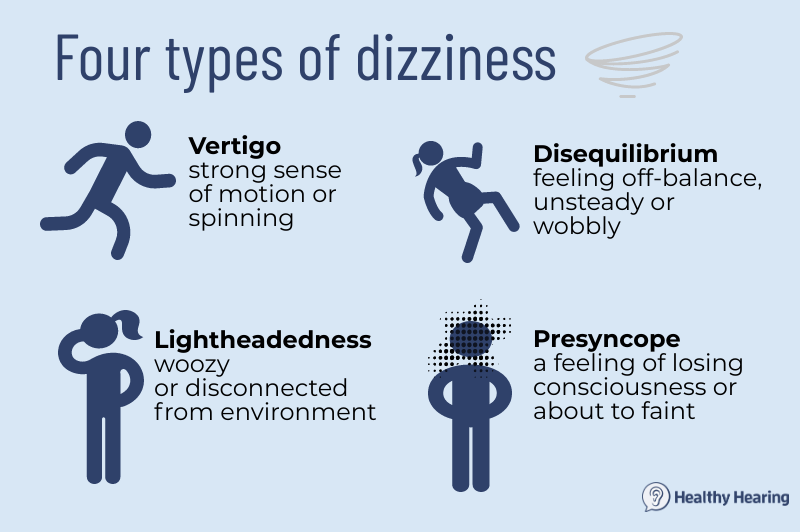|
www.HealthyHearing.com |
Dizziness
By Joy Victory, managing editor, Healthy Hearing Last updated on: December 15th, 2025 Dizziness is common, and often caused by inner ear problems. Here's what you can do to get help for dizziness and lightheadedness. Key points:
Dizziness is the third most common complaint reported in medical clinics across the United States. Its causes range from harmless to potentially serious, but one of the most frequent contributors is inner ear problems. In this article, we’ll explore what dizziness can feel like, common causes, available treatment options, and when it’s important to seek medical care. What is dizziness?
reasons people see a doctor. Dizziness affects your sense of balance. It can come in many different forms, causing a sensation of unsteadiness, spinning or general disorientation. You may feel lightheaded, nauseated, woozy or like you might faint. To understand how dizziness occurs, it helps to know how the balance organ and vestibular system work: The balance organDeep inside your ears, there are three tiny semicircular canals filled with fluid and crystals, known as endolymph and otoliths. The crystals float and move around in the fluid in response to your body's angular position. Two other sac-like structures, the utricle and saccule, detect vertical and horizontal movements. Together, these structures are called your balance organ and they help your body detect up from down, left from right, as well as forward and backward motion. The vestibular systemThe balance organ coordinates with your eyesight and the muscles and joints in your body to provide you with a sense of balance and orientation in your environment. This is medically known as the vestibular system. Dizziness occurs when there is a problem with the vestibular senses or the brain areas that connect them. What does being dizzy feel like?Traditionally, dizziness has been divided into four main categories, according to the American Academy of Family Physicians:
Common causes of dizzinessInner ear issuesSome of the most frequent causes of dizziness arise from problems in your inner ear. A disturbance in the blood circulation or fluid pressure in the inner ear can trigger dizziness and tinnitus. For example, a bad cold can swell your inner ears and lead to bouts of dizziness.
What does it mean if you have hearing loss and dizziness?Your balance and hearing are linked and share a common pathway to the brain. This is why lots of things can cause both dizziness and hearing loss, including:
If you experience sudden dizziness and hearing loss, see a doctor right away as this may be a sign of a medical emergency. Ringing in the ears and dizzinessAdditionally, many disorders that affect the inner ear can lead to ringing in the ears (tinnitus) and dizziness. These conditions include:
What does dizziness caused by inner ear problems feel like?Dizziness caused inner ear problems may feel like vertigo, unsteadiness or lightheadedness. It may be constant or intermittent, and aggravated by certain head motions or sudden positional changes. Although nausea and vomiting may occur, people do not typically lose consciousness as a result of inner ear dizziness. Other causes of dizzinessThere are many other causes of dizziness that are not related to the function of the inner ear. They are generally sorted into two categories: central and visual. Central dizzinessCentral dizziness happens when the brain cannot coordinate the inputs from the three parts of the vestibular system. Some causes of central dizziness include:
Visual dizzinessVisual dizziness is a sensation of unsteadiness or disorientation triggered by visual stimuli, like moving patterns, crowded spaces, or rapid motion in your environment. It can happen when the eye muscles are imbalanced or there are errors of refraction, such as when you borrow a pair of eyeglasses from a friend with a different prescription. It can also be caused by eye strain or vision problems like astigmatism. Systemic causesDizziness can also stem from systemic issues such as:
When should you see a doctor for lightheadedness?Because dizziness can be caused by so many different factors, you don't always need to see a doctor for symptoms that are brief, mild and resolve on their own. However, you should see a doctor for dizziness if it’s severe, doesn't go away or affects your daily life. Seek medical attention immediately if woozy feelings are accompanied by other concerning symptoms like:
All of these can be signs of a medical emergency. What will your doctor ask?To figure out what's causing dizziness, a medical provider will take a thorough medical history and exam. They will likely ask you about any prescription or over-the-counter medications that you take as drug interactions are a common, but sometimes overlooked cause of lightheadedness. The same is true of alcohol and caffeine–both can interact with your medications. Testing optionsThere are a wide array of tests a doctor may use to evaluate dizziness, including blood tests and imaging like CT scans. They may be performed by a primary care doctor, a physical therapist, cardiologist or neurologist and will partially depend on any additional symptoms you might have. Inner ear testingIn some cases, especially if you experience hearing loss, you may undergo a hearing test, often followed by an Auditory Brainstem Response (ABR) test. An ABR test noninvasively records brainstem responses to sound stimuli. The brain waves are collected while you rest comfortably with your eyes closed. The presence or absence of hearing loss or auditory brainstem anomalies will provide clues to the physician about the cause of your symptoms. Another common test for balance is VNG, or videonystagmography. A VNG test is usually done by an ENT doctor or an audiologist. It uses video cameras to record eye movements. During the test, a patient follows a visual target. The patient is also moved into different positions. The ear canals are stimulated with warm and cool air or water. This test gives a broad picture of whether the underlying issue is related to the inner ear or not. More: Is your dizziness from labyrinthitis, BPPV or Meniere's? How to know How do you treat dizziness?Your treatment will be determined by the cause of your dizzy symptoms and can include medication, surgery, diet, lifestyle changes or some combination of these. For BPPV, dizziness can be treated by a simple head positioning maneuver. There are also physical therapists who specialize in vestibular rehabilitation, which is a treatment for balance disorders that gradually retrains the brain to compensate for lost sensory input from the balance system. Finding an audiologist near youIf you are experiencing hearing loss or tinnitus in addition to dizziness, visit our directory to find a local hearing care provider to help with that part of your treatment plan. Joy Victory, managing editor, Healthy Hearing
You are reading about: Related topics More information about hearing loss, hearing aids, hearing aid brands and assistive devices. Featured clinics near me
Earzlink Hearing Care - Reynoldsburg Find a clinicNeed a hearing test but not sure which clinic to choose? Call 1-877-872-7165 for help setting up a hearing test appointment. Related contentThe Healthy Hearing Report |
|
www.HealthyHearing.com |
Dizziness
By Joy Victory, managing editor, Healthy Hearing Last updated on: December 15th, 2025 Dizziness is common, and often caused by inner ear problems. Here's what you can do to get help for dizziness and lightheadedness. |




 Joy Victory has extensive experience editing consumer health information. Her training in particular has focused on how to best communicate evidence-based medical guidelines and clinical trial results to the public. She strives to make health content accurate, accessible and engaging to the public.
Joy Victory has extensive experience editing consumer health information. Her training in particular has focused on how to best communicate evidence-based medical guidelines and clinical trial results to the public. She strives to make health content accurate, accessible and engaging to the public.